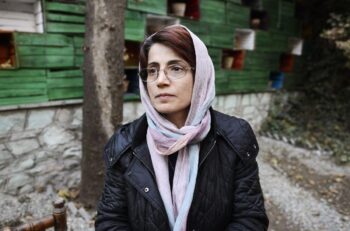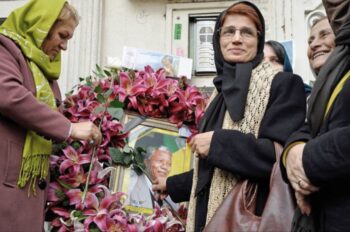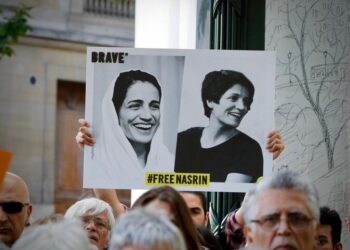Film Review: Nasrin Directed by Jeff Kaufman
Amnesty International hosted the New Zealand premiere of NASRIN at Sky City Theatre, a documentary that presents an intimate and moving depiction of one woman’s efforts to protect human rights and promote equality for all within Iran.
The subject of the documentary is Nasrin Sotoudeh, an Iranian human rights attorney who was sentenced in March 2019 to a total of 38 years in prison and 148 lashes for the charges of “appearing without a headscarf in public” and “publishing false information to disturb public minds.” Both of these offences each carry a punishment of 74 lashes.
This is not the first time Sotoudeh has been persecuted due to her peaceful promotion of equality in Iran. In September 2010, she was arrested on charges of ‘spreading propaganda’ and ‘conspiring to harm state security’ which would be the first of many charges laid against Sotoudeh in the coming years.
 She was convicted in January 2011 and sentenced to 11 years imprisonment, banned from practising as a lawyer, and was refused travel outside of Iran. She spent much of this initial incarceration in solitary confinement and was released without explanation three years later in September 2013.
She was convicted in January 2011 and sentenced to 11 years imprisonment, banned from practising as a lawyer, and was refused travel outside of Iran. She spent much of this initial incarceration in solitary confinement and was released without explanation three years later in September 2013.
In September 2016, Sotoudeh was sentenced to five years imprisonment. Sotoudeh was unaware of the conviction as it happened ‘in absentia’; without her being present and without access to legal representation.
For her most recent charges, she was once again tried in absentia by the Revolutionary Court in Tehran after refusing to appear due to being unable to appoint her own legal counsel.
She was sentenced to 33 years in prison and 148 lashes for charges which (in addition to the above charges) included ‘assembly and collusion against national security;’ ‘propaganda against the state;’ ‘encouraging corruption and prostitution;’ and ‘appearing at the judiciary without Islamic hijab’.
Her husband and supporter, Reza Khandan, has stated that only the longest sentence will be served (10 years) of the current charges, in addition to the previous five from her 2016 trial in absentia. In July 2020 and January 2021 respectively, the bank accounts of Nasrin and Reza were frozen by the Iranian Prosecutor’s Office, while in August 2020 their daughter, Mehraveh Khandan, was arrested and later released on bail.
Since 2010, Nasrin has committed herself to several hunger strikes while confined in prison, in protest of being refused visits by her family, the restrictions placed upon those visits, the associated restrictions placed on her family in the way of travel bans, and the continued harassment of her family and friends associated with advocating for her release and fair treatment under the law.
Much of this is touched upon and spoken of in the documentary, NASRIN, which would ideally be used as a starting point for conducting independent research and the pathway to discourse on global human rights and collective action instead of a symbol of international solidarity that we can say we are now a part of.
This is because, on a technical level, the documentary is full of flaws, with varying quality of the footage, concealed and shaky phone recordings obscured by a shirt sleeve, and most egregiously its application of subtitles.
The occasionally misspelled word leads to entire sentences filled with errors, and occasional (but long) patches of speech not translated at all. Jarringly, there are occasions where the subtitles revert to simply “(foreign language)” and others where it seems only a small part of an interviewee’s speech has been subtitled.
(Note: Amnesty International has confirmed that the screening included a draft version of the subtitles, which will be shown as complete in the official release of the documentary)
But then, this is not like other documentaries or films, and the relevancy and urgency of the subject matter and its release to the world isn’t marred by these faults, but highlighted.
The majority of contributors to the documentary could not be listed due to the fear of extreme persecution merely due to their involvement, and through the lens of a critique, this encourages a new perspective to what would be difficult to normally dismiss as technical errors.
 The footage used in the film was so difficult to obtain and at such great personal and familial risk that almost the entirety had to be filmed in secret. A subject and individual so forcibly hidden by their country that to fret over perfection would be to deny a glimmer of hope to the individual and the spark of revolt across a passive and indifferent world.
The footage used in the film was so difficult to obtain and at such great personal and familial risk that almost the entirety had to be filmed in secret. A subject and individual so forcibly hidden by their country that to fret over perfection would be to deny a glimmer of hope to the individual and the spark of revolt across a passive and indifferent world.
When looking beyond a critical view of the film on a technical level, it reveals this as a film of urgency, one which requires immediate viewing and immediate discussion, and one which cannot be forgotten or left to disappear into history as so many like-minded and peaceful individuals often are.
Despite all of this, despite the tragedy and brutality and the shocking displays of disrespect and dehumanising action taken against Nasrin, it is a documentary filled with the most authentic beauty capable within the human spirit; the endurance of the heart and the soul through love and hope.
While there is little humour in the documentary, there are moments of human joy and Nasrin, despite knowing that she is only one voice fighting against a torrent of oppression, takes every opportunity to embrace these moments of joy where possible. This is, after all, part of what she is fighting for – the freedom of the individual, the freedom of choice, the freedom to find love, and joy in life and embrace it.
One scene in particular of Nasrin, finally seeing her family while in prison, highlights the unthinkable strength and endurance of love within.
Filmed through the glass of the visiting room, Nasrin is playing with her son through the glass and plucking his imaginary nose to entertain and joyfully connect with him, while her daughter remains stoic and wipes tears from her eyes. It is a scene that shows a human being embracing every possible moment of joy within her life, no matter how desperately the regime she is under wishes to strip her of it.
It’s this scene that shows the strength of human compassion, of love and endurance against the darkness which so easily and insidiously makes its home in the minds of many. It’s the endurance of the heart, a true and full heart filled with love for all that is good and just in life. It is the endurance of pain and hardship through the love that can only be found and shared between equals who support and encourage that love within themselves and each other.
At the heart of the documentary is a message on liberty – the liberty we must allow each other as humans to live our lives with true freedom of individual choice. To not be bound by societal pressures or religious conservatism, but to embrace our true and authentic selves, and to find the courage to share this with others even when we face inevitable persecution.
We must endure – not for ourselves, but for the world and the future of the world, for everyone in the world and not just ourselves, or our friends, or our local social circles and interests. It is a victory we may never see in our lifetime but can guarantee for another, and a sacrifice that requires a strength many of us will never find.
For those that have found that strength, and choose to endure that pain in the search of peace and equality within the world, for those that advocate for freedom and true, measured justice, we simply must give them our attention, our support, and our love in return.
It is our endurance that changes the world, and it is our love for each other that fuels that endurance in a way no other emotion can. This is a documentary of love, hope, and endurance, and one which every human being should see, not only to be outraged to take action, but to be inspired to make a difference.
NASRIN is written, produced and directed by Jeff Kaufman and produced by Marcia Ross, and features acclaimed filmmaker Jafar Panahi, Nobel Peace Prize laureate Shirin Ebadi, journalist Ann Curry, exiled women’s rights activist Mansoureh Shojaee, and Nasrin’s equally courageous husband Reza Khandan.
NASRIN is narrated by Olivia Colman and features a musical score by Tyler Strickland, an original song by Lynn Ahrens and Stephen Flaherty, and a musical performance by Angélique Kidjo.
Oxford Lamoureaux
Information on NASRIN can be found here: https://www.nasrinfilm.com/
You can watch NASRIN here: https://vimeo.com/ondemand/nasrindocumentary
You can learn more about Amnesty International and its involvement in freeing Nasrin Sotoudeh here: https://www.amnesty.org.nz/free-nasrin-sotoudeh-now
- Iron Maiden – Spark Arena: September 16, 2024 (13th Floor Concert Review) - September 17, 2024
- The Dead South – Powerstation: April 5, 2024 (Concert Review) - April 6, 2024
- Queens of The Stone Age – Spark Arena: February 29, 2024 (Concert Review) - March 1, 2024

